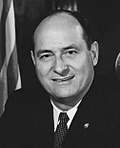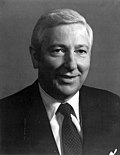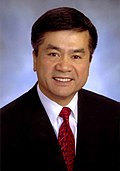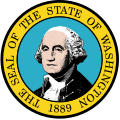| Governor of Washington | |
|---|---|
 Seal of the governor | |
| Style |
|
| Status | |
| Residence | Washington Governor's Mansion |
| Term length | Four years, no term limit |
| Inaugural holder | Elisha P. Ferry |
| Formation | November 11, 1889 |
| Succession | Line of succession |
| Deputy | Lieutenant Governor of Washington |
| Salary | $218,744 [1] |
| Website | governor |
The governor of Washington is the head of government of Washington and commander-in-chief of the state's military forces. [2] [3] The officeholder has a duty to enforce state laws, [4] the power to either approve or veto bills passed by the Washington Legislature and line-item veto power to cancel specific provisions in spending bills. [5] The Washington governor may also convene the legislature on "extraordinary occasions". [4]
Contents
- List of governors
- Territory of Washington
- State of Washington
- Timeline
- Electoral history (1952–)
- See also
- Notes
- References
- External links
Washington Territory had 14 territorial governors from its organization in 1853 until the formation of the state of Washington in 1889. Territorial governors were appointed by the president of the United States. Elisha P. Ferry had the longest term of eight years and went on to become the state's first governor. William H. Wallace was appointed governor but never took office due to being elected as the territory's congressional delegate. George Edward Cole was appointed governor and took office, but his appointment was never ratified by the U.S. Senate and he was replaced as governor after four months.
Twenty-two individuals have held the office of Governor of Washington since the state's admission to the Union, with Arthur B. Langlie serving non-consecutive terms. Populist Party candidate John Rankin Rogers is the only non-Democratic or Republican nominee to win office. The most recent governor to be from Eastern Washington was Clarence D. Martin, elected in 1932. [6] The current governor is Democrat Bob Ferguson, who took office on January 15, 2025.






































